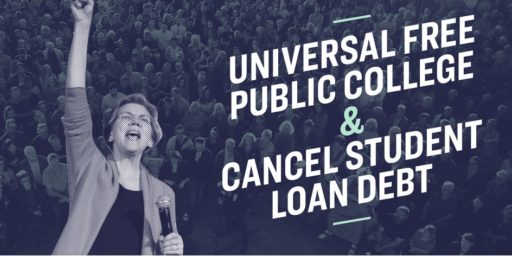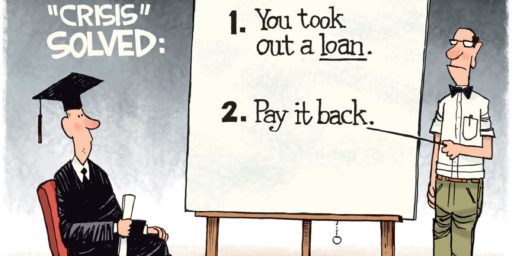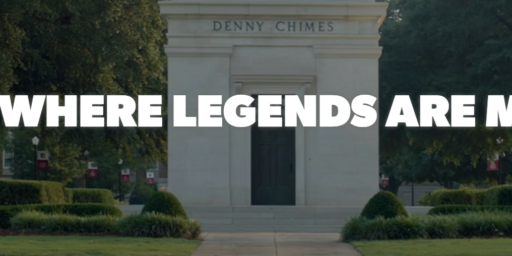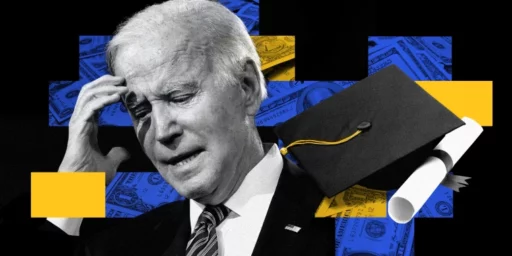The Warren And Sanders Plans To Cancel Student Loan Debt Won’t Solve The Problem
Senators Warren and Sanders have both proposed plans to forgive student loan debt and make public colleges tuition-free. That's easier said than done.

As James Joyner noted earlier this week, Senator and Presidential candidate Bernie Sanders rolled out a plan that would forgive some $1.6 trillion in student loan debt, which he claims he could finance by means of a tax on financial transactions on Wall Street. This follows on the heels of a plan that fellow candidate Senator Elizabeth Warren first rolled out in April. Warren’s plan, though, is somewhat less extensive than the Sanders plan since it proposals to eliminate $1.25 trillion in debt, although it’s possible that the numbers in the respective plans are different to the manner in which the calculate the amount of outstanding debt. In addition to canceling student debt, both plans would make all public colleges tuition-free.
As James Joyner notes in his posts about both the Warren plan and the Sanders plan, these loan forgiveness plans raise significant moral hazard problems that make it likely that they would just make the situation worse. In addition to that, though, one thought that occurs to me is exactly what authority either a President Sanders or a President Warren would have to make even just public colleges “tuition-free.” These institutions, after all, have been established and are controlled at the state level. There is nothing in the Constitution that gives the Federal Government the authority take over administration of the university systems of the states and dictate how they must operate, although it is the case that much of the money that the Federal Government provides to such institutions comes with strings attached that attempt to amount to that level of control. What happens, though, if some states refuse to participate in the plan?
The Supreme Court has already ruled that Congress cannot force the states to participate in national plans like this, a holding that was most recently confirmed in National Federation of Independent Businesses v. Sibelius, the Obamacare case in which the Court upheld the majority of the Affordable Care Act but ruled 7-2 that the Federal Government could not force the states to expand their Medicaid programs. Based on this, neither Warren or Sanders would be able to force the states to make their colleges tuition-free, nor would it be able to force them to extend that tuition-free status to students whose parents are not state residents.
Leaving that issue aside for now, for obvious reasons, both of these plans appear to be quite popular among those inclined to support either Warren or Sanders, who to a large degree are seeking support from the same wing of the Democratic Party. As Kevin Carey notes at The New York Times, though, both plans contain details that make it likely that there would be negative unintended consequences if the plan ever managed to become law:
Senator Bernie Sanders on Monday proposed canceling all $1.6 trillion of outstanding student loan debt in the United States, one-upping a rival for the Democratic presidential nomination, Senator Elizabeth Warren, who has proposed canceling $640 billion of the debt.
But there is a potential problem with the Sanders plan, and, to a lesser extent, the Warren plan. Their solutions for the past and plans for the future don’t line up.
The scope of higher education borrowing is vast. There are over 44 million student debtors, and researchers estimate that as many as 40 percent could default. Other Democratic candidates have put forth proposals to make college cheaper and debt easier to repay. But none of the plans are so big as those from Mr. Sanders and Ms. Warren.
“I don’t often use the phrase, but today we are, in fact, offering a revolutionary proposal” that will let people “get all of the education that they need to live out their dreams,” Mr. Sanders said in introducing his bill.
Both Mr. Sanders and Ms. Warren, who is sponsoring a separate bill, have proposed making all undergraduate programs at public colleges and universities free. That would reduce the need for borrowing. But it would not eliminate future student debt — not even close.
Now you might ask why there would still be student loan debt in an era after Sanders and Warren have somehow managed to make public colleges tuition-free. The answer is that most student loan debt isn’t used to pay tuition at public colleges:
Most student loan debt isn’t taken out to attend undergraduate programs at public colleges and universities. Most loans are used for private colleges, for-profit colleges and, most of all, graduate school.
According to the Department of Education, only 45 percent of student loans are used to attend public colleges and universities, presumably because tuition at those schools is already lower than in the private sector.
The department also reports that 40 percent of loans are taken out to attend graduate or professional school — for example, master’s and Ph.D programs, law school, business school and medical school. This number is large because graduate school is expensive and, in contrast with loans for undergraduates, there is no hard cap on how much money students can borrow from the federal government for graduate school. People can borrow the full cost of tuition, books, supplies and living expenses to attend any accredited graduate or professional program. This is why hundreds of graduate programs produce average loan balances of $100,000 or more.
Combine the two statistics, and it’s clear that the majority of all student loans are taken out to attend private colleges or graduate school.
This means that the day after Senator Sanders “hits the reset button,” as he put it in the news conference, the national student debt odometer would begin rapidly spinning again.
Some of the more enthusiastic supporters of the Sanders or Warren plans would say that the answer to this dilemma would be to somehow make private colleges and graduate school tuition-free, but that would make both programs far more expensive than they already are on paper. Given that they’d likely end up costing much more than projected even if implemented as the Sanders and Warren have proposed, though, that would mean we’d be talking about a program that would end up costing well above even the $1.6 trillion dollars that Sanders is blithely suggesting we spend on this. Additionally, it raises significant questions of fairness with respect to both graduates of public and private colleges who have been fiscally responsible enough to pay off their loans and to those who either choose not to go to college or choose not to go to graduate school. Most importantly, such a program would clearly seem to require that taxes be raised not only on “the rich” but on all income earners, and why should a guy who barely gets by driving a truck to pay his family’s bills subsidize someone who will end up earning far more than he ever will or someone who wants to go to medical school, law school, or get a Masters degree or Ph.D. with an eye on a career in academia?
Carey raises another question worth considering regarding student loan debt that would be accrued after these plans take effect:
Will those later debts be forgiven, too? If not, the plan would create a generation of student loan lottery winners, with losers on either side. People who had already paid back their loans would get nothing. People with future loans would get nothing. People with debt on the day the legislation was enacted would be rewarded.
If, on the other hand, the legislation creates an implicit promise that all kinds of future student debt will also be forgiven, it could have unintended consequences.
The Sanders and Warren plans control the cost of public undergraduate education by setting tuition to zero and keeping it there. So financing public higher education would become a matter of the federal government and states deciding how much they want to spend on higher learning. The universities would have no pricing power, because there would be no prices.
Graduate programs, by contrast, would still be mostly free to charge whatever they like, as is the case today. With the precedent of loan forgiveness established, graduate programs could be tempted to charge even more, since students might never have to pay back their loans.
So while Sanders and Warren’s respective plans would provide relief for a select few, it would not solve the problem entirely and expanding either plan to cover tuition at private colleges and at the graduate level would increase the respective costs of both programs significantly to the point where paying for them would inevitably require increasing taxes across the board, especially if the plans are implemented alongside other trillion-dollar “plans” in areas such as health care reform and infrastructure spending that both candidates have put forward so far.
Realistically speaking, of course, the odds of a program like the ones Warren and Sanders have proposed actually getting through Congress stands somewhere between slim and zero. This is due not only to structural issues such as the legislative veto in the Senate or electoral concerns such as the possibility that the GOP could regain control of the House as early as 2022 if a Democrat manages to win the White House next year, but also to the fact that the plans themselves essentially provide benefits to what amounts to a privileged segment of the public, college graduates, at the expense of those who either chose not to go to or could not get into college. That raises the prospect of having some of the most vulnerable members of the Democratic base subsidizing people who, after graduation, stand to make much more over the course of their lifetimes than they ever well. Which, of course, means that even some Democratic members of Congress might not be quite as enthusiastic about these ideas as the hardliners who support Warren and Sanders obviously are.
How exactly is that fair?






In my opinion the important thing is that it is being discussed.
If any legislation ever happens it will be far different than either of these proposals. That’s a good thing.
Note that no Republican is the least bit interested in this. But they did jack the deficit a roughly equal amount in order to benefit large corporations.
Which is of the best service to the country? Maybe neither, but certainly not the later.
The problem of student loan debt is simply a microcosmic sample of the problem with consumer debt in general. And the problem probably can’t be solved by any means because some people just choose to live on 125% of their income (or in the case of the lowest quintile of American society, must live on because there is a floor that they don’t earn up to)
Thanks, Doug, for posting such a fact-filled article with a good summary of the issues. This makes a great starting point for policy discussion.
To me, the key questions are:
1. What market failure requires intervention?
2. What behaviors and outcomes are we trying to incentivize?
3. What policy action will most efficiently provide those incentives and lead to those outcomes?
4. Are there any issues of fairness or justice that need to be accounted for?
I would love to hear some less fuzzy discussion of questions #1 and #2. Everyone seems to agree that “college is too expensive”, but a lot fewer people seem to be asking whether attending college is the answer to the right question. What is it we’re trying to accomplish? A more educated populace? More people ready to enter the workforce? Higher GDP growth? More equal opportunity across economic and social lines? There’s no reason to think that there is one policy that is best for achieving all of those things.
My semi-tutored 2 cents: sweeping debt forgiveness of a particular cohort is a terrible idea, regardless of the economic outcomes. It fails the equity test and the incentives tests, badly. What would be better? Again, that depends on what you’re trying to accomplish.
One other comment before I go. In my experience, when almost anyone asks a question about fairness, they’re asking because they see that they’re not going to come out as far ahead as they’d like to be if the change happens.
A middle class life pretty much requires a college degree these days, and we are effectively using college costs to keep it out of reach of the poor. It reinforces the lack of social mobility.
It also delays home ownership, and intentionally having kids.
I’m not worried about the moral hazard, when moral hazard is only applied to the little people. I do worry that paying off all student loan debt, and paying it off going forward would just encourage the private colleges to charge more.
Public colleges need to be affordable. States have been cutting funding as long as I have been alive, and given how frequently people move, I’m not sure states are really the right level for public colleges.
Fix the public schools so they are affordable (which might be free) first, then address private schools (I’m thinking limiting any subsidies to the amount of subsidy a public school gives — the delta between actual cost to the school and the tuition), and then worry about the folks who already have a crushing debt.
Another quick aside, commenting on something in the NYT article:
It only confuses the discussion to conflate graduate school (MA, MS, PhD) with professional school (MBA, JD, MD, etc.). The public policy issues, the student populations, the incentives, and the economics are totally different. This is especially true for postgraduate degrees that are de facto licensing requirements for prestige professions, such as law and medicine.
There is a strong public policy argument for subsidizing training that is required to participate in the workforce above subsistence levels. In the current job market, that means bachelors’ degrees from 4-year colleges or professional certificates from 2-year colleges. There is a weaker case for subsidizing continuing professional education of valued career fields, such as master’s degrees for teachers and other civil servants. I’m not sure there’s any public policy case at all to be made for universal subsidy of law school or medical school or architecture school, distinct from individual merit-based or affirmative action scholarships, or debt forgiveness based on completing a term of public service.
Shorter Doug: Previous generations had to suffer under a really bad system and it would be unfair not to make future people suffer if we actually fixed the system.
Same concept as “We should keep hazing and torturing folks because it wouldn’t be fair to the people who were hazed and tortured in the past to stop now.”
A thought process that can only be described as morally bankrupt.
Ultimately, the reality is that our higher education system is broken and we need to figure out how to fix it. Maybe these ideas aren’t the right ones but you can’t defeat nothing with nothing and all both these posts have done is point out problems with concepts that aren’t fully fleshed out yet. Same song and dance we heard pre-ACA.
If we really wanted to get rid of student debt, we’d get rid of all educational loan programs, period. I suspect that we’d very quickly see a crash in the university education bubble and the development of other training programs on line.
What is it that we’re trying to do with college, anyway? Parents use it as babysitting halfway house for four years until their little darlings get dumped out into the real world; kids use it as four more years of “not needing to worry about things” and “following my dream” even though the chances of getting a job based on a degree in underwater basketweaving is slim, to put it mildly. And companies now use a bachelor’s as the bare minimum before they’ll even look at someone’s resume. (Haven’t people ever learned the concept of “learning on the job”?!)
Feh.
@DrDaveT: I think most states have a law school debt forgiveness plan if you take up certain not-so-well-paid public positions. And several states have put similar programs for medical school debt if you’re willing to go out and work in rural areas.
@DrDaveT:
Let me quibble on Med School – right now, a part of the reason that our health care expenses are higher for non-acute care than the rest of the developed world is the amount of debt doctors come out of med school with.
@grumpy realist:
Haven’t seen too many jobs that actually teach someone how to think critically or communicate well. The type of time it takes to accomplish that isn’t small.
@DrDaveT :
It’s the fact that no one wants to admit you don’t need higher education to function in most jobs. Seriously, you think you need a degree to work in an office? Most of the skills you need are either considered basic functionality you gain by being alive in a digital society at this point (typing, certain computer programs like Excel, etc) or will be as time goes on (basic code competency). Unless your job requires a specific skillset obtained from your degree program, you don’t use the degree you graduated with in any practical sense. Your job will likely offer some training because they assume you don’t have all the skills they want.
So why do we do it? Tradition and social expectations.
Boomers encouraged their children to get degrees because back then, it mean access to better jobs. In the 40’s and 50’s, having a degree was rare and indicated some form of intellectual work as opposed to manual labor. So they grew up with this notion that degree = smart = high wages. They started going to school but not nearly in the numbers their descendants would.
Boomers pushed their kids into school whether it was the best option for them or not solely to try and shove them up the social ladder.
However, like with any commodity, scarcity is a huge factor in it’s value. A doctor can charge a fortune because doctors are rare and in demand – if every 10th grad was a doctor, your hospital bill would likely be paid with what’s in your wallet. The more degrees flooded the market, the more worthless they become. Instead of indicting an exceptional or specialized applicant, it became another box to tick off. It happened to high school education, too. Back in the day, it was a sign you were able to complete schooling instead of having to work. Now, we consider it so basic a requirement there’s a stigma attached to GED regardless of the reason for it.
Society needs to admit that most folks are not working in the jobs their degrees are in. It contributed little to their practical career other then letting them fill in that blank on the application. It’s a bill we forced young people to incur with little to no gain anymore.
Michael Grant hit the core issue with this in his comment on James’s post on this topic: employers who are mindlessly listing college degrees as a minimum for hiring.
“Degree inflation” is a vicious cycle that will be difficult to get out of, I fear. I’ve seen job listings with absolutely stupid degree requirements–entry-level jobs prioritizing those with Master’s degrees, for heaven’s sake–and the salaries are garbage for those degree requirements.
It is beyond stupid for an employer to require a Master’s degree for an entry-level job that pays $35K-$40K a year, and yet I’ve seen it. I had hoped that the current job market would do two things: increase salaries and reduce these idiotic degree requirements.
Employers are a big part of the problem. They don’t want to train anyone anymore, they want plug & play employees from day 1. They use computer algorithms to scan applications, so people with experience that don’t meet degree requirements — and who could likely start at the salaries they are offering because they DON’T have insane loans to pay off–are tossed out of the running.
Meanwhile, those who do get these jobs job-hop as quickly as possible to make more money, further entrenching the employer attitude that they can’t risk training someone. And on and on it goes. Students see that they have to have a college degree (those with college degrees earn more on average than those who do not, and are less likely to be laid off, etc.), so they go into some small debt for the undergrad degree, only to learn upon graduation that they need a graduate degree, and then get in way over their heads in debt for jobs that won’t sufficiently pay off that debt and allow them to save for emergencies and, you know, have a life.
It’s a hot mess and what really needs to happen is that the demand side (employer requirements) needs to come down. Way down.
I see that @KM: and I are on a similar wavelength.
@grumpy realist:
But don’t get critically sick while you’re under one of these work-for-debt-forgiveness contracts though. That happened to someone I know, and the debt clock restarted while this person was in the hospital; was in and out of critical care for ~2 years and now the debt is so high they will never be able to pay it off–it is way far and above what was borrowed because of the years of accumulated interest/paying back provision for not fulfilling the work commitment contract, etc.
I’m all about people paying for what they’ve contracted to borrow, but feel like there should be some kind of brakes put on for those who get cancer, extremely sick, etc.
@SKI:
No, that’s not what he said. He noted that there’s going to be concern about fairness from those that managed to pay off the debt and what’s owed to them. Let’s be honest – if we’re going to come up with a bailout for students who are drowning in debt, there’s no reason we can’t scrounge up a little more to toss to those who accomplished the feat within a reasonable look-back period. Why not reward their industry with some cash back or a one-time tax refund? Isn’t the point to help the economy by getting the younger generations to be financially secure enough to make the big purchases (house, car, vacation, etc)? What’s wrong with giving 10% of the overall bill (including interest) back to anyone who’s paid off their bill in the last decade if we’re going to wipe out 50% or more of someone else’s existing debt?
I think it’s incredibly interesting that this is never a feature in any debt relief program. It’s the “screw you, I got mine” mentality in reverse – “you’re not actively suffering so screw what you went through”. To use your example, it’s denying justice or compensation to any previous hazing victims and only future victims get to take legal action. So sorry you got the crap beat out of you and all those medical bills you managed to pay off but only kids currently being beaten qualify for money for their medical bills! So sorry it’s caused the *exact same burden* on you financially but since you were unfortunate enough to pay off that bill a month ahead of the plan going into effect, you get nothing while your neighbor gets a clean slate.
We can help current victims, future victims and past victims at the same time. If we’re raising an absurd amount of money anyways, might as well raise enough for everyone to get a stake. We don’t need to be pitting folks against each other on this issue and fostering unnecessary animosity.
The graduate school thing is a particular problem. We are basically subsidizing a higher ed grift. Many programs are admitting way more students than there are positions for. They charge them astronomical fees, paid for mostly by big loans, and then dump them into a labor market that is terrible. In the meantime, these students do a lot of the teaching and faculty hires have hundreds of applicants so they have their pick of the litter. We are subsidizing this system with government funds, using the students as a conveyance mechanism and saddling them with massive predatory debt.
(I went to grad school, but in science. So my tuition was paid and I got a stipend. This is not true of most non-science disciplines.)
There is no way any lender would fork over money for that nonsense if the loans could be discharge in bankruptcy. The main changes I would make: cut off or limit student loans for grad school, make loans dischargeable in bankruptcy and eliminate the system of fines that can blow up a modest loan into a nightmare that no one can escape from. This student loan system is the predatory thing this side of loan-sharking. Time to end it.
@SKI: Not in grumpy realist’s defence or anything, but I think that “thinking critically” and “communicating well” should be learned before you graduate from high school. Most people aren’t going to usefully use a year’s worth of trigonometry in their adult lives; why not make that an elective and put in a required year of speech and debate?
@SKI:
I disagree, for two reasons:
1. There is no necessary link between physician debt and physician salaries. The market pays doctors what the market will bear, which has nothing to do with how much debt the doctors incurred during training. The causation is the other way around — because doctors are highly paid, they are willing to incur crazy debt to get the job. Sometimes irrationally willing.
2. There’s no shortage of doctors; there’s a distribution problem. The incentives should be for doctors to do the jobs that are currently underserved, rather than (say) becoming a big city radiologist or anesthesiologist. Student loan programs don’t do that; if anything the provide the opposite incentive.
I missed this the first time through.
Why do you say that, Doug? More specifically, do you have a sense for how much revenue could be raised by taxing Wall Street transactions before the economic drag would outweigh the benefits? The total value of all financial transactions is in the quadrillions of dollars annually. Even a simple 1% federal sales tax would generate trillions of dollars in revenue, matching or surpassing total personal income tax revenues. More nuanced schemes, with different rates based on dollar value and/or how long the asset has been held, could do even better while addressing other problems with how the market currently functions.
@David S. :
I would love to see a generic Life Skills degree. It would certify that you’ve been taught the basics of life that we just assume someone’s learned by that point in their life. Things like budgeting and basic accounting, how to maintain a home and car with basic repairs, how to cook yourself healthy food, how to think critically and discern fake news from real, basic civics and rights, and computer skills. You know, what would have been things like Home Ec and Shop back in the day. This would essentially be the 5th year of high school with no other coursework then how to learn to be a successful adult. Offer them for guaranteed by law dirt cheap rates of say $20 per student and each student gets an government allotment of $100 per semester. Anything more the student wants to take is on them with minimal student loan backing to cut out the loan-sharking as @Hal_10000 noted.
We don’t millions of English students, we need millions of citizens who can speak and write in proper English. We don’t need millions of Accounting students, we need millions of citizens who can do basic accounting. If college is to be a place of learning, then society needs to point out we shouldn’t be paying exorbitant rates to learn interesting but useless tidbits. If college is a place of training for future careers, then stop funneling students into useless degrees there’s no jobs for. If college is to be higher education for the sake of preserving rare but necessary skillsets and esoteric knowledge, it’s not for the masses and shouldn’t be required.
Society’s view of college needs to change. It’s no longer the only place one can learn things – access to libraries, remote learning and the internet changed that. A degree for the sake of a degree is as useful as a screen door on a submarine – yes, it’s a technically functional access point but damn if the negatives don’t kill you off before you can experience any positives.
@David S.:
We already do. That’s why English is required every year. The remedial English classes are focused on things like basic spelling and grammar, how to organize text into paragraphs, and how to write clearly and say what you mean.
Of course, that doesn’t help, because it’s already too late for most of the kids who are in remedial English classes in high school. If they were going to learn this stuff, they already would have.
@DrDaveT:
(2) is a direct result of (1) since it all goes back to money. We are running short on GPs because you can make a fortune specializing in something like dermatology with better hours and hella less stress. You’d need to offer some serious subsidies to get someone to work at somewhere rural as a primary care physician, let alone in the ER. When you’re one of the only docs around, you tend to have to work some serious overtime in an area with little amenities to spend that hard-earned cash on. Not only that but your job will constantly at risk since small hospital close all the time so why add unnecessary job insecurity into the mix?
@Jen: Job hopping is a very serious thing these days. Companies aren’t going to take care of you and if you don’t keep looking out for and taking better offers you’re just going to get screwed.
I definitely agree that the degree requirements have gotten to stupid levels.
For significantly less than either of these programs, the government could also retire all outstanding credit card debt, which would benefit a much larger group of Americans and would be also distribute more of the benefits to lower income Americans.
Why would these programs be better use of the money?
@KM: Yeah, but if we start going the way you want us to go then we’ll have to start admitting that the goal of our educational systems is to create skills gluts that depress wages so we can criticize the poor for ‘being too lazy to pull themselves up by their bootstraps.’
And then where would we be? My God! We’d have to start paying people enough to live on for the work they do. And for only working one job. How is the “middle class” supposed to stay ahead if we start doing that?
I can’t help but be reminded of the bank bailouts…I guess individuals with student loan debts and credit card debts are too little to succeed…if only they were as big as the banks…
@David S.:
Once upon a time, high schools in Mexico had a common core for the first two years, then split into four “areas.” The areas had different curricula, suited to specific career choices. I don’t quite recall what the divisions were but at least there was one for humanities, one for engineering/math and one for biology/medicine.
I dropped out after one year, and switched to a two-year program school. This one had one year common core and one in “areas.” But this was changed to all-common core by the time I enrolled.
So I can’t say of my own experience how well this worked.
What’s still done is that colleges have selection tests for proficiency in certain subjects, like math. You can get credits for your score, or be required to take remedial courses if your major requires it.
I wasn’t taught critical thinking in high school. I got to it by my side interest in science.
@Kathy: My roommate at MIT had the theory that in most universities, critical thinking was taught through literary criticism.
At MIT we got it through the lab courses and learning how to calculate all the error bars for whatever we produced. (“Yes, Joseph, your data points look very nice. Unfortunately your error bars run the length of the page.”)
@DrDaveT:
Higher education is expensive, specially at an American context, where universities are far more luxurious than in Europe, Asia and Latin America. “Free College” is either regressive, because you force people to compete for the few free slots in the public universities or inefficient.
There are very few tuition-free colleges among the best ranked universities in the world. As I like to point out UNAM(Mexico) or USP(São Paulo) are have similar rankings as Virginia Tech.
One result of paying off everyone’s college is that inflation would be staggering.